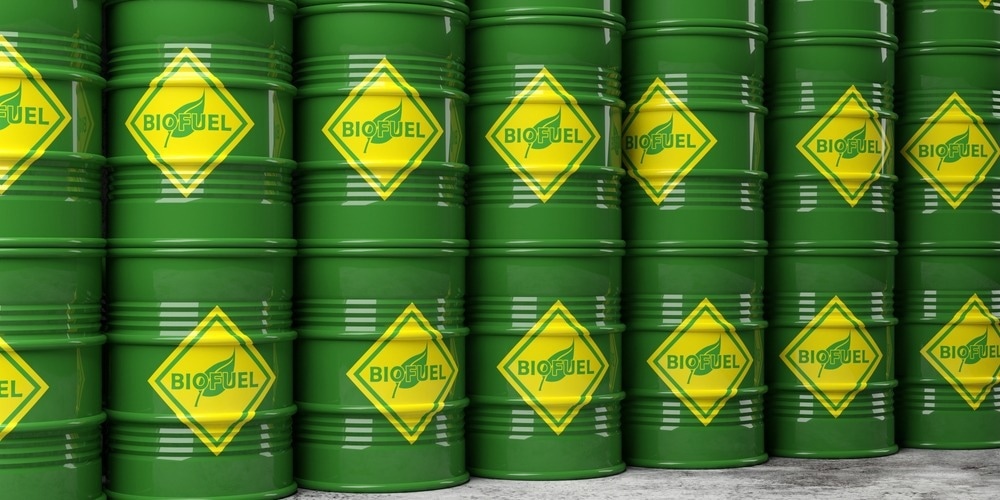Writing in the journal Petroleum Exploration and Development, scientists from the China University of Petroleum in Beijing and CNPC Engineering Technology R&D Company Ltd. have explored the development of sustainable and green bio-based flat-rheology drilling fluids.

Study: The biodiesel-based flat-rheology drilling fluid system. Image Credit: Shawn Hempel/Shutterstock.com
Deep-water Offshore Drilling Challenges
Oil and gas have surged in demand over the course of the past century or so due to increasing industrialization, population growth, and urbanization. Fossil fuels are used for key societal applications such as transportation and heavy industry, and this growing demand has led to an increasing number of offshore and deep-water drilling wells.
With deep-water offshore drilling comes some key challenges. Underwater formations, which can be weakly cemented and unstable, can cause issues with wellbore stability, natural gas hydrate generation, and blocked pipelines in high-pressure and low-temperature areas near mudlines. This impacts safety, drilling efficiency, and the financial cost of drilling operations.
These challenges must be overcome to ensure the viability of offshore rigs, and help companies meet their environmental protection obligations, which are becoming steadily more stringent.
Oil-based Drilling Fluids
Drilling fluids are an essential element of deep-water offshore oil and gas exploitation and recovery efforts. This is due to their superior stability and inhibition capabilities. There are, however, some critical issues with current oil-based drilling fluids which affects their performance and sustainability.
Temperature greatly affects the rheology of oil-based drilling fluids, however. In the low-temperature and high-pressure environments typically found at depth, the fluid can thicken, affecting its efficiency and the recovery of valuable petrochemical resources. This can lead to increased equivalent circulating density and a loss of circulation. Additionally, it can cause an increased risk of wellbore collapse.
Another challenge is with the base oils themselves, with diesel oil being a commonly utilized base oil. These oils are non-renewable and possess significant ecotoxicity, which means that they cannot meet increasingly stringent marine environmental protection regulations and the aims of the low-carbon economy. Due to these restrictions, scientists have researched alternative drilling fluids in recent decades.
Synthetic Drilling Fluids
Synthetic drilling fluids have been developed since the early 21st century to overcome the problems with oil-based fluids. These fluids are more sustainable than conventional variants and possess superior viscosity-temperature characteristics. Synthetic fluids are combined with treatment agents such as rheology modifiers and organic clays to improve their properties and performance.
Research in this area has led to the development of flat-rheology synthetic base drilling fluids with excellent rheological properties such as stable gel viscosity at low shear rates over a range of operational temperatures. These fluids possess stable equivalent circulating densities and, crucially, are more environmentally safe than oil-based drilling fluids.
Advances in flat-rheology fluids have broadened operational temperature differences and simplified their formula. Already, they have provided promising results in real-world applications, with a number of commercial products available. However, issues exist with their renewability, cost, and reliance on fossil fuel-derived raw materials. Therefore, research has turned to more sustainable and green chemical options derived from vegetable and animal by-products.
The Research
The new paper has investigated the use of bio-derived oils to manufacture flat-rheology drilling fluids. Several recent studies have demonstrated the non-toxicity, sustainability, eco-friendliness, and low-cost nature of these green chemical options.
Whilst some challenges persist with the properties and performance of bio-derived oils compared to conventional oils, compatible treatment agents can overcome these shortcomings. Thus far, according to the authors, targeted research is lacking in this area.
The authors have prepared an environmentally friendly and cost-effective biodiesel-based drilling fluid with flat-rheology characteristics by optimizing raw materials. The fluid possesses good fluidity at low temperatures. Biodiesel is used as the base oil, with compatible key treatments optimized and added to produce the final product.
Soybean ethyl ester biodiesel was used as the base oil. Emulsifier combination, oil-water ratio, and the organic clay additives were optimized. A coconut oil fatty acid and dimer fatty acid-modified flat-rheology treatment was prepared. Use of the treatment forms a stable network of emulsion droplets, which overcomes problems with viscosity at low temperatures. The prepared fluid possesses a density of 12 g/cm3.
Anti-pollution performance and marine ecotoxicity were evaluated in the research using artificial seawater and shale cuttings for anti-pollution and Moina mongolica larvae and Artemia nauplii used for marine toxicity studies. The results of both evaluations displayed excellent environmental performance for the prepared fluids.
The biodiesel-based drilling fluid displayed excellent flat-rheology properties within a temperature range of 2-90 oC and at a 90:10 oil-water ratio. Additionally, the fluid can resist temperatures up to 160 oC, seawater pollution of 5% and 10% shale cutting pollution. Furthermore, due to the utilization of bio-derived raw materials, the fluid has significant renewability, sustainability, and eco-friendly characteristics.
More from AZoM: A to Z of Electromagnetic Shielding
Further Reading
Jiang, G, Shi, H & He, Y (2022) The biodiesel-based flat-rheology drilling fluid system Petroleum Exploration and Development, 49(1), pp. 200-210 [online] sciencedirect.com. Available at: https://doi.org/10.1016/S1876-3804(22)60016-8
Disclaimer: The views expressed here are those of the author expressed in their private capacity and do not necessarily represent the views of AZoM.com Limited T/A AZoNetwork the owner and operator of this website. This disclaimer forms part of the Terms and conditions of use of this website.